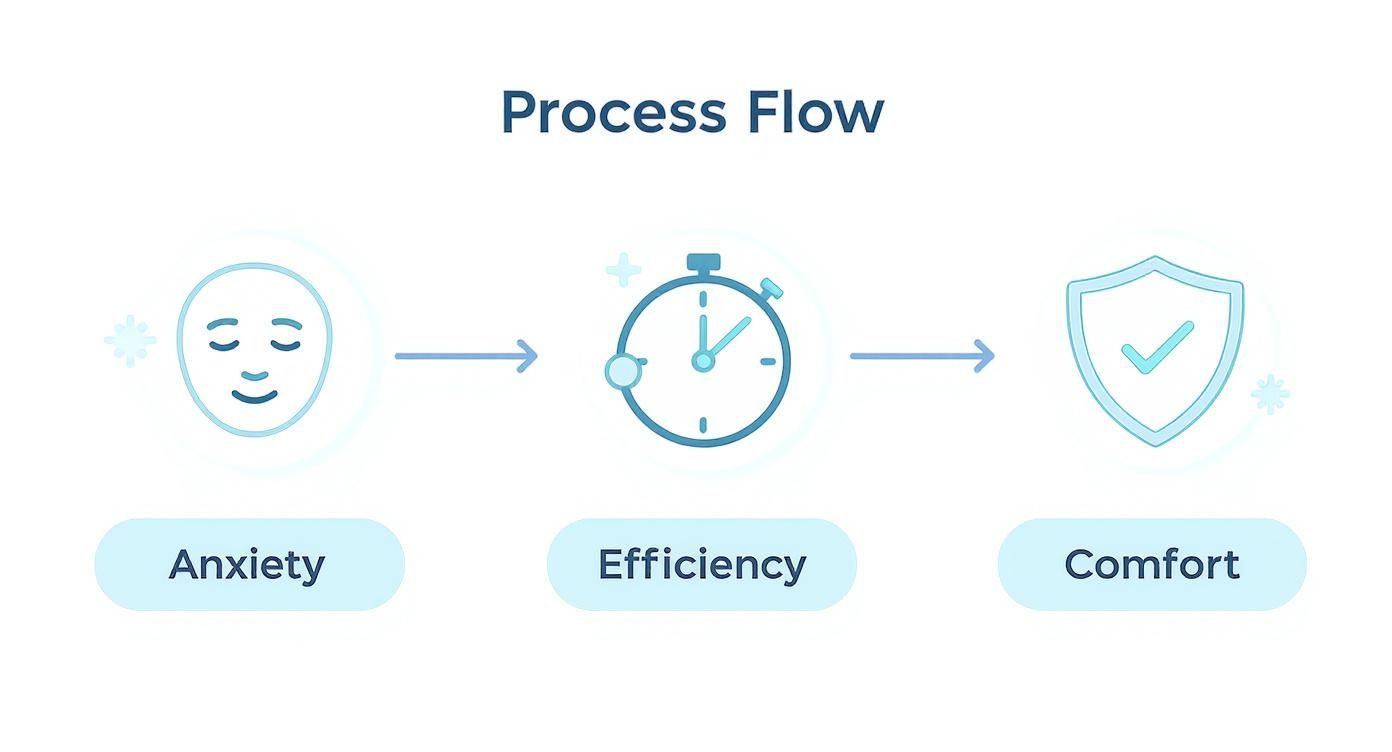What Is IV Sedation Dentistry? A Guide to Dental Comfort
- Caterina Rutter
- Nov 18, 2025
- 8 min read
If the thought of a dental visit fills you with dread, you need to know about IV sedation dentistry. It's a highly effective technique that uses a safe, anti-anxiety medication administered directly into your bloodstream. The goal is to help you reach a state of profound relaxation, making your dental care comfortable and stress-free.
This method is often called “twilight sleep.” You'll remain conscious and able to respond, but you'll be so relaxed that you likely won’t remember much, if anything, about the procedure itself.
Unlocking a Genuinely Stress-Free Dental Visit
Think of IV sedation as the express lane to comfort. Unlike taking a pill, which can take time to work, an IV delivers medication that takes effect almost immediately. This gives your dental team precise control over your sedation level, allowing for real-time adjustments to ensure you remain perfectly comfortable and safe from start to finish.
This technique is a cornerstone of modern dentistry, enabling countless patients to receive necessary care without fear. Research shows how common this approach has become, with one study finding that 75.7% of dentists in the US and Canada use sedation to improve patient experiences. You can review the complete findings on sedation in dental practices for more details.
Who Is a Good Candidate for IV Sedation?
While IV sedation can benefit anyone seeking a more comfortable dental visit, it is particularly effective in specific situations. Consider discussing IV sedation with your dentist if you:
Experience moderate to severe dental anxiety or phobia.
Have a strong gag reflex that interferes with dental work.
Require multiple or lengthy procedures in a single appointment.
Have a low pain threshold or difficulty getting numb with local anesthetic.
Ultimately, the purpose of IV sedation is to transform a potentially stressful appointment into a calm, manageable, and even forgettable experience, allowing you to prioritize your oral health.
How IV Sedation Actually Changes Your Dental Visit
Let’s move beyond the clinical definition and focus on what IV sedation actually means for your appointment. Its real value lies in its ability to completely reframe the dental experience. It guides you from a state of high anxiety to one of genuine calm, turning essential dental work into a peaceful event. For the millions who suffer from dental phobia, this is the key that unlocks access to the care they need for a healthy smile.
The most immediate benefit is the way it dissolves fear. Once the medication takes effect, the feeling of dread fades away, allowing you to rest comfortably while our team handles everything. This relaxed state also alters your perception of time—a two-hour procedure can feel like it was over in just a few minutes.
We Can Accomplish More in a Single, Relaxed Appointment
A major practical advantage of IV sedation is efficiency. When you are completely relaxed, your dentist can perform multiple treatments or a complex procedure in one session that might otherwise require several appointments. This saves you time and reduces the number of visits to the office.
For example, if you need several fillings, a crown, and a tooth extraction, that could mean three separate, stressful appointments. With IV sedation, it's often possible to complete all of this work in a single, consolidated visit.
This is especially beneficial for extensive work like full-mouth reconstruction or placing multiple dental implants. Patients can undergo significant treatment and wake up with a transformed smile, all without the strain of being fully aware during a long procedure.
Getting Past Physical Roadblocks to Treatment
IV sedation provides a practical solution for physical challenges that can complicate dental work. It's an invaluable tool for anyone with a sensitive gag reflex, which can make even routine procedures feel overwhelming. The sedation relaxes the throat muscles, preventing the reflex from being triggered and allowing your dentist to work effectively.
It also helps individuals with a low pain threshold or those who have trouble getting completely numb from local anesthetic alone. The deep relaxation from IV sedation enhances the effectiveness of local anesthetic, ensuring you remain completely comfortable and pain-free throughout the entire procedure.
The Patient Journey: What to Expect Step-by-Step
Understanding the process of IV sedation dentistry can significantly reduce any pre-appointment anxiety. We've designed a clear, predictable workflow to ensure you feel safe, comfortable, and informed every step of the way.
It begins with a detailed pre-procedure consultation. During this meeting, we will review your complete medical history, discuss your dental fears, and answer any questions you have. This step is critical for confirming that you are a suitable candidate and allows us to create a sedation plan tailored specifically to you.
On the Day of Your Procedure
Your first action item is to arrange for a responsible adult to drive you to and from your appointment. You will not be able to drive safely afterward, so this is non-negotiable.
Once you are settled in the dental chair, we will gently place a small IV line, typically in your arm or hand. The sedative is administered through this line, and you'll feel the effects quickly. A profound sense of calm will wash over you, easing you into a serene, dream-like state.
This infographic breaks down the key benefits of the patient experience—from reducing anxiety to increasing comfort, which helps us deliver care more efficiently.

As you can see, our process is designed to put you at ease, streamline your treatment, and guarantee your comfort from beginning to end.
Monitoring and Gentle Recovery
Your safety is our absolute priority. Throughout the entire procedure, our specially trained team will continuously monitor your heart rate, blood pressure, and oxygen levels. This vigilant monitoring is a fundamental component of safe IV sedation.
This level of care is standard for all procedures, including complex treatments. For example, we apply this same rigorous protocol to ensure patient safety and comfort during wisdom teeth removal in Tempe.
Once your dental work is complete, we will stop the medication, and you will begin to wake up gradually. Feeling groggy is completely normal. Before you leave, we will provide clear aftercare instructions to both you and your driver to ensure a smooth recovery at home.
Are You a Good Candidate for IV Sedation?
Determining if IV sedation is right for you begins with a conversation with your dentist. It's an excellent option for patients who require a deeper level of relaxation than what nitrous oxide (laughing gas) or oral sedatives can provide.
A primary reason patients choose IV sedation is to manage moderate to severe dental anxiety. If the mere thought of a dental appointment causes distress, this method can help you receive necessary care in a state of complete calm.
For more tips on managing dental fear, explore our guide with proven strategies to overcome dental anxiety.
Who Benefits Most from This Approach
Beyond anxiety relief, IV sedation is a practical solution for specific physical and procedural needs. You are likely an ideal candidate if you have:
A Sensitive Gag Reflex: An overactive gag reflex can make dental work difficult. Sedation relaxes these involuntary muscles, preventing the gagging response.
A Low Pain Threshold: The deep relaxation from IV sedation enhances the effects of local anesthetics, ensuring you remain comfortable throughout your treatment.
Complex or Long Procedures: If you need extensive work, such as multiple dental implants or several extractions, IV sedation allows us to complete these treatments in a single, efficient appointment.
However, IV sedation isn't suitable for everyone. Patients with certain respiratory conditions, known allergies to sedative medications, or those who are pregnant may need to explore alternative comfort options.
The technique is widely used in specialized dental fields. For example, one study noted that two-thirds (66.6%) of oral surgeons use it regularly, highlighting its importance for more invasive procedures. You can learn more by reading about the use of IV sedation in dentistry.
Key Takeaway: The only way to know for sure is to schedule a consultation. An open discussion about your health history, concerns, and treatment goals will allow us to develop a safe and effective plan tailored to you.
Is IV Sedation Actually Safe?
It is completely normal to have questions about the safety of IV sedation. The answer is yes, it is exceptionally safe when administered by a properly qualified professional.
Dentists offering IV sedation have completed extensive, specialized training and certification that goes far beyond standard dental education. This rigorous training ensures they have the expertise to not only administer the sedative but also to manage your well-being throughout the entire procedure.

We're Watching Over You The Entire Time
From the moment sedation begins until you are fully awake, a qualified team member is dedicated to monitoring your vital signs in real-time. This is a constant, vigilant watch.
We closely monitor several key indicators:
Heart Rate: To ensure your heart maintains a steady, normal rhythm.
Blood Pressure: To keep your blood pressure within a safe and stable range.
Oxygen Levels: To confirm you are breathing properly and your body is well-oxygenated.
This continuous monitoring allows us to make precise, immediate adjustments to your sedation level, ensuring you remain both safe and comfortable. Our guide on how dental sedation works provides more detail on these essential safety protocols.
Data confirms the safety of this practice. A large-scale study of procedures in certified facilities found the rate of serious complications to be extremely low—just 0.31 life-threatening events per 100,000 cases. This statistic underscores the reliability of IV sedation when performed by a trained professional.
With a qualified team, constant monitoring, and proper safety protocols, IV sedation is a trusted tool that makes essential dental care accessible and comfortable.
Your IV Sedation Questions Answered
Even after understanding the process, you likely have practical questions about your own experience. Here are answers to some of the most common questions we receive, designed to help you feel fully prepared and confident.
Will I Be Completely Asleep During IV Sedation?
No, and this is a key distinction. You will not be fully unconscious. IV sedation induces a state of deep relaxation often called "twilight sleep."
While you will be conscious enough to hear and respond to simple instructions, like turning your head, you will be so relaxed that you likely won't remember the procedure afterward. This is fundamentally different from general anesthesia used in hospitals, which renders a patient completely unconscious.
How Long Does Recovery from IV Sedation Take?
The most potent effects of the sedative will wear off shortly after the IV is removed, but you should expect to feel groggy for several hours.
To ensure a safe recovery, you must follow these actionable steps:
Arrange a Ride: You are required to have a responsible adult drive you home. You cannot safely operate a vehicle.
Rest and Recuperate: Clear your schedule for the remainder of the day. Focus on resting and avoid any strenuous activity.
Postpone Major Decisions: For a full 24 hours, you must avoid driving, operating machinery, and making any important financial or personal decisions. This allows the medication to completely clear your system.
This 24-hour rule is a critical safety measure. Adhering to it protects you and others while the sedative fully wears off.
Is IV Sedation Covered by Dental Insurance?
Coverage for IV sedation depends entirely on your specific insurance plan and the nature of your dental procedure.
Insurance providers are more likely to cover IV sedation when it is deemed "medically necessary." This typically applies to invasive procedures like the removal of impacted wisdom teeth or other major oral surgeries.
If sedation is used primarily for managing anxiety during routine procedures, it may be considered an elective service and might not be covered. Your best course of action is to contact your insurance provider before your appointment to request a pre-authorization. This will give you a clear understanding of your coverage so you can plan accordingly.
Are you ready to experience a truly comfortable and stress-free dental appointment? At Beautiful Dentistry, we specialize in safe and effective IV sedation to help you get the care you need without anxiety. Schedule your consultation today at https://zdentist.com and let us create a personalized plan for your comfort.

